The Opera Singer's Daughter
Tales of women’s struggle for independence and self-worth in Southeast Asia are not uncommon, but April Tiang’s authentic storytelling and fearless treatment of a woman’s desire for love is an important contribution.
In The Opera Singer’s Daughter, readers are introduced to women who struggle in loveless marriages to save their children and parents who sell their sons as a commodity. Greed, perversion, and sacrifice are all exposed as Tiang carefully describes what women will do to survive in a society that devalues them.
There are beautiful and complex moments in this book: a mother choosing between taking care of her beloved daughter or leaving her with family members in order to earn a better living; a daughter growing up feeling unloved and ashamed of her socioeconomic status but understanding that her mother, owner of a café, was “making many lives bearable with a fragrant cup of steaming hot coffee.” These vignettes juxtapose proud, capable, sometimes devious women against societal assumptions that they are weak and without merit.
While the cover image of The Opera Singer’s Daughter, a black-and-white photo of smiling women in richly embroidered clothes coyly interacting with their imposing male counterparts, may seem disconnected from the poverty and real-life hardship of the story’s heroine, role-playing and the scripted ritual of “love” is evident on every page of the book.
Each of the story’s three sections is introduced with a poem that explicitly defines a memory of or a longing for love. These poems condition readers to understand the story not as a sad tale but as the experience of a woman who feels what they have felt: desire and heartbreak. Through this lens, political and economic inequality are given flesh and blood, and the reader will see and experience the heroine’s pain in a very authentic way.
The Opera Singer’s Daughter is very nearly an all-around success. Despite the fact that Tiang’s mastery of English is imperfect at best, a strong editor could easily have cleared up some of the more obvious clichés and mixed metaphors to make the book more readable. It is difficult to see past the spelling of character names that change from one paragraph to the next and sentences like this one: “If I was taking care of myself and looked great, it was be to impress myself.”
Despite the rough delivery, anyone interested in a tale of strong women fighting society for economic power, emotional freedom, and independence will want to read this story.
Reviewed by
Sara Budzik
Disclosure: This article is not an endorsement, but a review. The publisher of this book provided free copies of the book and paid a small fee to have their book reviewed by a professional reviewer. Foreword Reviews and Clarion Reviews make no guarantee that the publisher will receive a positive review. Foreword Magazine, Inc. is disclosing this in accordance with the Federal Trade Commission’s 16 CFR, Part 255.

